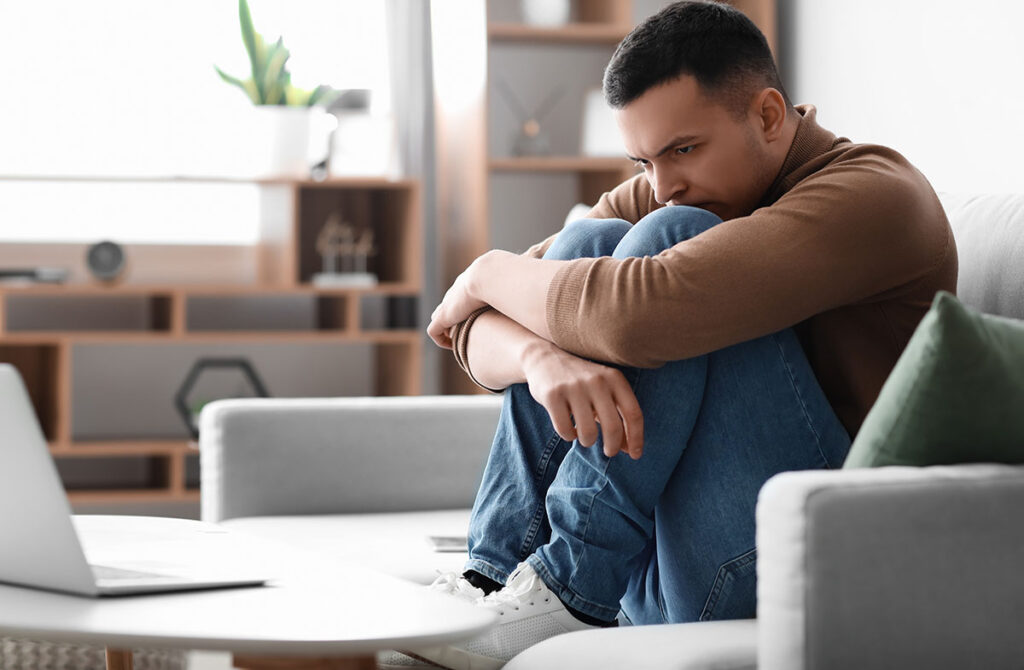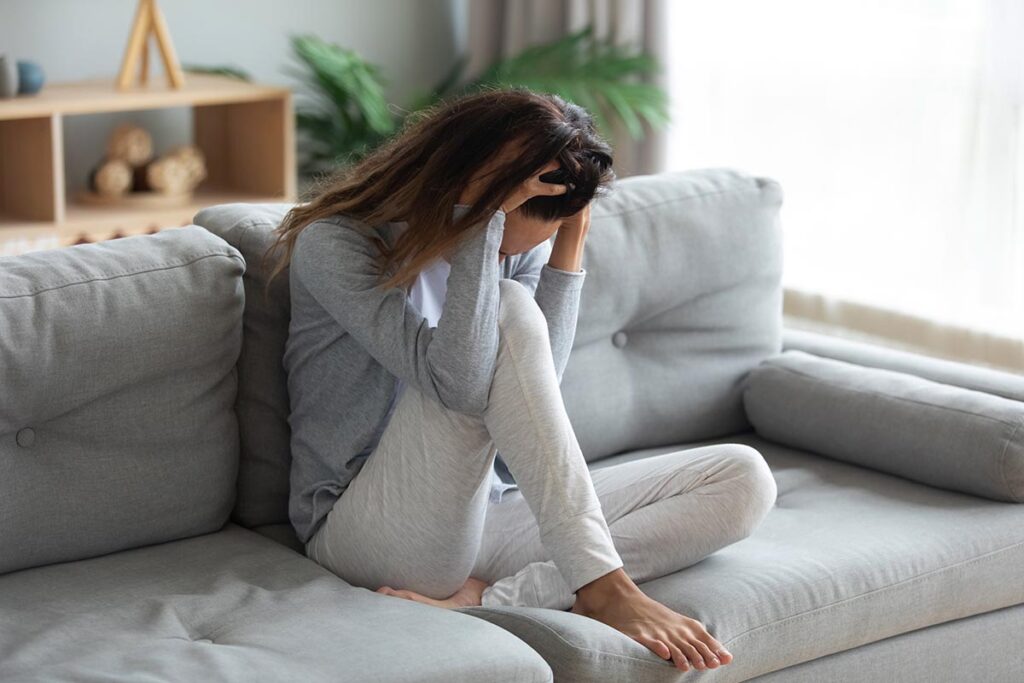 For those seeking anxiety disorder treatment in Indiana, understanding the complexity of this condition is helpful. Anxiety issues are more than just being on edge or worried; they involve a range of symptoms that can drastically impede someone’s daily activities.
For those seeking anxiety disorder treatment in Indiana, understanding the complexity of this condition is helpful. Anxiety issues are more than just being on edge or worried; they involve a range of symptoms that can drastically impede someone’s daily activities.
We’ll also explore the negative effects untreated anxiety can have on both physical and mental health over time. Our discussion will extend to various treatments offered by highly skilled behavioral health professionals, including cognitive behavioral therapy. We’ll also examine unique psychiatric treatment approaches like alternative therapies.
Finally, we will introduce you to NuLife Behavioral Health Indiana. NuLife Behavioral Health treats mental health concerns in the Indianapolis metro area. We offer evidence-based psychiatric care with a range of services from intensive outpatient care full to medication management.
Understanding Anxiety and Its Impact
Anxiety is a chronic psychological condition that wreaks havoc in our minds. To understand it better, we need to explore the science behind anxiety.
The science behind anxiety: Fight, flight, or freeze response
Picture this: you’re a caveman, minding your own business, when suddenly, a saber-toothed tiger appears. Your body goes into overdrive, ready to fight, flee, or freeze. Fast forward to modern times, and our stressors trigger this ancient response unnecessarily. The whole fight-flight-freeze reflex happens because your entire nervous system, including your brain, is always ready to switch into high gear—in fact, too ready.
When we perceive a threat or a potential threat, our bodies release powerful chemicals that flood our bodies. These chemicals have wide-ranging effects, but primarily they rev the body up. They include cortisol, dopamine, serotonin, and adrenaline.
In anxiety disorders, your body reduces, but never shuts off, the production of these chemicals as it does in people without anxiety disorders. Anxiety disorders result from tiny but excessive amounts of these energizing chemicals leaking into your bloodstream. This tiny trickle ensures your mind and body never, ever calm down to a relaxed state.
But the anxiety cycle is not yet finished. Because our bodies are always revved up, our minds, on some level, never let us calm down. The perception of danger never goes all the way away. We feel threatened because our bodies are telling us we’re threatened. Perceiving the physical feelings of being in danger causes our minds to elevate our physical response, until we’re so anxious, we end up living with one of the many types of anxiety disorders.
How modern-day stresses contribute to increased anxiety
In today’s world, where work never ends and personal time is a myth, anxiety becomes our unwelcome companion. This constant worry puts our fight-or-flight response on steroids, leaving us in a perpetual state of anxiousness. It’s like our nervous system is doing a never-ending marathon.

Types of Anxiety
A person who feels anxious more often than not may be experiencing one form of anxiety more powerfully than the others. One of the keys to reducing anxiety is understanding what’s fueling one’s symptoms, and knowing the particular form of anxiety will help you understand more about the anxiety symptoms you’re experiencing. It also affects the type of treatment you need.
Anxiety is a broad term that refers to a family of disorders, which include:
- Generalized Anxiety Disorder (GAD). Generalized Anxiety Disorder involves a general sense of overwhelming dread without an identifiable source, or a high degree of uncontrollable worry far out of proportion to a perceived threat. According to the American Psychological Association, Generalized Anxiety Disorder is the most common type of anxiety in the US.
- Social Anxiety Disorder (SAD). A person with Social Anxiety Disorder has an incapacitating dread of being judged harshly in public and a debilitating fear of embarrassment.
- Panic Disorder. Panic Disorder involves a person having regular but unpredictable panic attacks. A panic attack causes a person to feel overwhelming fear, even though they understand fully there’s no reason to be afraid at all. Panic attacks happen anywhere and can incapacitate a person, even causing them to lose consciousness.
- Phobias. Specific phobia disorder refers to an extreme and irrational fear of a specific place, thing, or situation that in and of themselves are not threatening or harmful. The fear is so intense a person will build their entire life around avoiding that thing or situation. Just a few examples of a specific phobia include arachnophobia (fear of spiders), coulrophobia (fear of clowns), and acrophobia (fear of heights).
- Separation Anxiety Disorder. Separation anxiety disorder is found in childhood and is an extreme and irrational fear of being taken away from the person they are most attached to, usually a parent or other caregiver.
- Agoraphobia. Agoraphobia is an intense fear of being overwhelmed and trapped in a situation or location the individual cannot escape from and cannot receive help.
NuLife Behavioral Health Indiana offers comprehensive treatment plans to help you regain control over your life. Say goodbye to debilitating fears and hello to a happier, healthier future. It’s time to get back to living a life free from anxiety.
Recognizing Symptoms of Anxiety
Anxiety is a complex condition that shows up in different ways for different people. Early detection is key to effective treatment, so let’s learn the signs.
Physical Signs of Anxiety
Anxiety can play tricks on your body, making you think you’re dealing with something else. Watch out for rapid heart rate, sweaty situations, trembling or shaking, fatigue, and sleep disturbances. A sore jaw and facial pain can also stem from anxiety, which may cause a person to clench their jaws or grind their teeth.
A study by the National Center For Biotechnology Information (NCBI) says anxiety can even mess with your gut, causing issues like irritable bowel syndrome (IBS).
Emotional Clues of Anxiety
Anxiety affects a person’s physical and emotional health. You might find yourself worrying about everything, feeling restless or on edge, struggling to concentrate, getting irritable for no reason, or avoiding social situations.
If these anxiety signs and symptoms stick around for weeks and start messing with your daily life, it’s time to seek professional help. According to the Anxiety And Depression Association Of America (ADAA), too many people suffer in silence, with only 36.9% getting the help they need.
Note:
- Everyone’s experience is unique, meaning that symptoms of anxiety differ from person to person.
- Symptoms may differ depending on the sort and seriousness of an anxiety issue.
If you’re not sure if what you’re feeling is anxiety, get a professional opinion.
The Damaging Effects of Ignored Anxiety
Ignoring anxiety can wreak havoc on your well-being. When stress becomes a permanent resident in your body, it unleashes adrenaline and cortisol. These hormones can be helpful, but in an anxiety disorder, their levels never drop back to normal.
The Physical Toll of Untreated Anxiety
Anxiety impairs a person’s physical health. Over time, it can pave the way for other health disorders like heart disease, diabetes, and gastrointestinal problems.
Just a few of the physical symptoms of untreated anxiety include:
- Heart Disease: Anxiety elevates your heart rate and blood pressure, putting you on the fast track to cardiovascular issues.
- Gastrointestinal Problems: Anxiety can turn your stomach into a rollercoaster ride of pain and discomfort. Left unchecked, anxiety can lead to irritable bowel syndrome (IBS).
- Weakened Immune System: Worrying non-stop weakens your immune system, making you an easy target for every germ that comes your way.
The Mental Mayhem of Lingering Anxiety
When untreated mental health conditions like anxiety are ignored, other mental health conditions worsen.
Depression, bipolar disorder, and anxiety can all occur at the same time, creating a downward spiral that sucks the joy out of life.
Substance abuse is a common side effect of trying to escape the overwhelming feelings anxiety brings. The fortunate thing is that there are successful methods of dealing with anxiety and any other problems that may have arisen due to it. Don’t let anxiety take control of your life; take charge and seek professional help.

KEY TAKEAWAY:
Ignoring anxiety can have damaging effects on both your physical and mental health. Untreated anxiety can lead to conditions like heart disease, gastrointestinal problems, depression, and substance abuse. Seeking professional help is crucial in managing anxiety and preventing further complications.

Seeking Professional Help for Anxiety Treatment
Managing anxiety is tough. To treat anxiety, you need experts on your side. Fortunately, there are plenty of resources and experts out there who specialize in treating this condition. The American Psychological Association says it’s important to seek professional help for chronic or severe anxiety.
Benefits of Behavioral Therapies for Anxiety
Cognitive Behavioral Therapy (CBT) is a proven treatment for anxiety disorders. It helps you understand your thoughts, identify triggers, and develop coping strategies. According to the JAMA Psychiatry Journal, CBT significantly reduces symptoms and functional impairment caused by anxiety disorders.
Alternative Therapies
There are also alternative treatments gaining recognition. Mindfulness-based stress reduction, yoga therapy, acupuncture, and even dietary changes have shown benefits, according to the National Center for Biotechnology Information (NCBI).
NuLife Behavioral Health offers comprehensive anxiety disorder treatment services tailored to your needs. They’ve got all the treatment modalities, from conventional to complementary approaches.
Transcranial Magnetic Stimulation (TMS).
TMS is a non-invasive, research-supported treatment approved by the FDA for use with depression, anxiety, bipolar disorder, obsessive-compulsive disorder, and several other mental health conditions. Transcranial Magnetic Stimulation (TMS) uses powerful, focused magnetic fields to stimulate groups of nerves within the brain that are underactive or inactive. TMS sessions take place on an outpatient basis and require no down time. A person can have a TMS session and return to their daily routine immediately.

KEY TAKEAWAY:
Seeking professional help for anxiety treatment is important, and behavioral therapies like Cognitive Behavioral Therapy (CBT) have been proven effective in reducing symptoms. Alternative therapies such as mindfulness-based stress reduction and dietary changes are also gaining recognition for their benefits. NuLife Behavioral Health treatment centers offer comprehensive outpatient services in the Indianapolis area to help individuals regain control over their lives and find relief from anxiety.
NuLife Behavioral Health – Your Partner in Managing Anxiety
Living with anxiety can feel like a never-ending battle, but you don’t have to face it alone. At NuLife Behavioral Health, we understand anxiety disorders and offer personalized treatment programs.
Contact Information & Initiating Treatment Plans at NuLife
Connect with us through our contact page to begin your recovery journey. Our team will guide you through an assessment process to develop a personalized treatment plan. We will identify your anxiety symptoms, but we won’t stop there. We aim to address the root causes of your anxiety disorder, not just the symptoms.
Our experienced team of therapists, counselors, and psychiatrists use evidence-based practices for effective mental health care. We offer outpatient services, Intensive Outpatient Programs (IOP), and Partial Hospitalization Programs (PHP) for flexible yet consistent support.
Every individual’s experience with anxiety is different, so our treatments are customized based on personal experiences and triggers. This ensures focused attention and better outcomes.
Addiction Treatment Services at NuLife
In addition to anxiety, we specialize in addiction treatment services. Our integrated approach allows us to treat both issues simultaneously, providing holistic care for long-term recovery success.
Our individualized addiction treatment programs include medically supervised detoxification if required, followed by therapy sessions aimed at understanding the underlying reasons behind substance use. The goal is to achieve sobriety and learn healthier coping mechanisms, improving quality of life over time.
The Role of Alternative Therapies in the Treatment of Anxiety Disorders
In addition to CBT and DBT, we employ alternative methods such as yoga, mindfulness meditation, and art therapy to treat anxiety. These alternative methods accentuate primary treatments for anxiety disorder by encouraging relaxation and diminishing stress levels, allowing for quicker healing.
Alternative complementary approaches enhance the benefits of primary therapeutic interventions, promoting relaxation and reducing stress levels for faster recovery and a happier future.

FAQs in Relation to Anxiety Disorder Treatment
What are the 5 types of coping strategies for anxiety?
The five main coping strategies include cognitive restructuring, exposure therapy, stress management techniques like deep breathing and progressive muscle relaxation, self-care practices such as regular exercise and healthy eating habits, and medication if recommended by a healthcare professional. For more information, check out NuLife’s Anxiety Treatment page.
What are 3 coping strategies for anxiety?
Three effective coping mechanisms include mindfulness meditation to stay present-focused, physical activity to reduce stress hormones, and social support from friends or family. Get more tips on our blog.
What are the 8 coping strategies for dealing with anxiety?
Eight strategies for dealing with anxiety include:
- Maintaining a healthy diet
- Getting enough sleep
- Engaging in physical activities such as yoga and walking
- Practicing mental exercises like mindfulness and positive affirmations,
- Seeking professional help when needed (contact NuLife)
- Joining support groups
- Limiting caffeine intake
- Avoiding alcohol
What are the 4 coping skills for anxiety?
The four key skills involve practicing mindfulness meditation, utilizing cognitive-behavioral techniques, maintaining a balanced diet and regular exercise routine, and engaging in self-care activities like reading or gardening. Learn more about these on our services page.
Get Help with Anxiety Disorders with NuLife
Understanding anxiety and its impact is crucial in recognizing the symptoms and seeking professional help for anxiety disorder treatment in the Indianapolis metro area.
As with all mental health concerns, untreated anxiety can have harmful effects on both physical health and mental well-being.
However, with the right support from the professionals at NuLife Behavioral Health, you can find relief.
If you or someone you know is struggling with anxiety, don’t hesitate to reach out to NuLife Behavioral Health for assistance.

Contact NuLife Behavioral Health Indiana Today
We are committed to helping individuals live fulfilling lives free from the adverse effects of substance use or mental health disorders. Our experienced and compassionate staff provides individualized treatment plans that address the specific needs and underlying causes of a client’s behavioral health concerns.
Wherever you reside in Indiana, contact us to learn more about NuLife Behavioral Health Indiana. We offer a variety of treatment programs that address a diverse array of substance use disorders and mental health conditions. Do not wait to get help for yourself or a loved one; begin living your best new life today!


